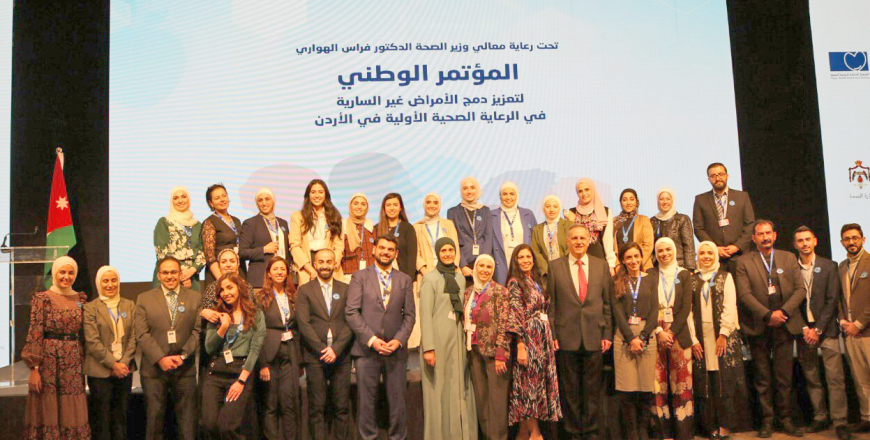You are here
Community clinics on mission to prevent non-communicable diseases
By Bahaa Al Deen Al Nawas - Aug 29,2019 - Last updated at Aug 29,2019

Non-communicable diseases cause 78 per cent of deaths worldwide and 71 per cent of deaths within the Jordanian population (Photo courtesy of WHO Jordan)
AMMAN — Non-communicable diseases (NCDs) cause 71 per cent of deaths worldwide and 78 per cent within the Jordanian population, according to the Royal Health Awareness Society (RHAS).
These figures were shared during the event “The Health Community Clinic: Impact and Way Forward” held on Thursday at the Intercontinental Hotel in Amman.
Noncommunicable diseases (NCDs), diseases that are not transmissible directly from one person to another, tend to be of long duration and are the result of a combination of genetic, physiological, environmental and behaviours factors, according to World Health Organisation (WHO).
One of RHAS’ programmes is called Health Community Clinic and builds clinics around the Kingdom to help people protect themselves from NCDs and their repercussions. It started in 2012 when Her Majesty Queen Rania opened the first clinic at Ain Al Basha Health Centre and is carried out in partnership with the Ministry of Health.
Health Community Clinics are built inside health centres and provided with the tools needed as well as staff training with the aim of raising awareness on heart problems, obesity, breast cancer and asthma among others.
Doctors at the healthcare centre treat patients and introduce them to the clinic, where they can go to gain more awareness about what they are dealing with, benefitting from advice and workout programmes.
So far, there are 45 Health Community Clinics around the Kingdom with the number of people directly benefitting from the programmes reaching 23,085 and indirect beneficiaries at 110,685 while health ministry cadres that underwent training reached 528.
At the end of 2019, the plan is to include 20 more health centres to reach a total of 65 clinics in the Kingdom.
Deputising for Minister of Health Saad Jaber, the Ministry’s Secretary General Adnan Ishaq said that Jordan has taken leaps in treating NCDs and has advanced technology to treat it, but preventive measures require societal awareness.
There are legislative measures to be taken, he said, noting that awareness should start from childhood, as NCDs are connected to habits and lifestyle, especially exercise, smoking and obesity.
“Many studies the ministry conducted revealed that diabetes cases increased from 7 per cent in 1996 to 16 per cent in 2007,” Ishaq said, noting the probability of having diabetes increases by 40 per cent if preventive measures are not taken.
More than 66 per cent of the Jordanian population is overweight, 13 per cent comprising youth between the ages of 13 and 15, according to Ishaq.
Moreover, he said that 50 per cent of the population do not perform any workouts or exercises and yet can be smokers from an early age.
For his part, RHAS Chairman Rami Farraj said that chronic diseases are increasing among the population, which means there is a need to find solutions as soon as possible and with the least cost, with the goal of reducing deaths caused by NCDs by 25 per cent in 2025.
He also said that the week from September 2-8 is the Global Week for Action on NCDs, which this year will be under the title “Enough NCDs”, hoping that the clinics and the programme will help Jordan commit to its international obligations to limit chronic diseases and NCDs.
Farraj said the results are not only in favour of the patients who benefitted from the programme, but also of the cadres themselves who felt more confidence in their work and appreciation from the community for their efforts.
Senior Programme Manager at the World Diabetes Foundation Jakob Madsen highlighted the partnership between the foundation and RHAS.
The opening ceremony concluded with a five-minute skit of stand-up comedy performed by comedian Sharif Alzubi, which raised awareness of the dangers of obesity, smoking and lack of exercise, shedding light on the importance of taking preventive measures to avoid chronic diseases and NCDs.
Related Articles
AMMAN — The Ministry of Health, the Royal Health Awareness Society and the World Diabetes Foundation organised a two-day conference under th
AMMAN — Minister of Health Feras Al Hawari met with a delegation from the World Diabetes Foundation (WDF) and the Royal Health Awareness Soc
AMMAN — Diabetes is the third-leading cause of death in Jordan, according to a recent survey by Gallup. The survey was issued in collab
















